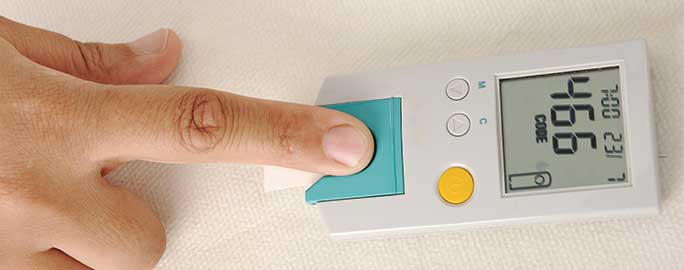
Symptoms of Diabetes to Watch For
There are two known types of diabetes: Type 1 and Type 2.
Type 1 Diabetes is an autoimmune condition which causes the immune system to turn on itself by attacking the beta cells of the pancreas. These beta cells are responsible for the production of insulin. As a result of Type 1 Diabetes, the pancreas produces very little insulin.
Type 2 Diabetes is a chronic condition where the body is unable to regulate the amount of glucose in the blood. This is generally a result, in part, of insulin resistance. This causes blood sugar levels to be higher than normal, which can cause certain symptoms to emerge.
Statistics published by the American Diabetes Association reveal that 29.1 million Americans had diabetes in 2012. Of those people, around 8.1 million don’t know they have the disease yet.
Diabetes is often called the ‘silent killer’ as many of the symptoms can be easy to miss. Yet rising blood sugar levels that remain untreated can act like a poison on your body.
The best way to know whether your blood sugar levels are at risk is to ask your doctor for a blood sugar test. However, there are also some common symptoms to watch for.
Increased or Frequent Urination
If you feel the need to urinate frequently, especially if you get up during the night to use the bathroom, it could be one of the symptoms of diabetes. High glucose levels force fluids out of your cells, which are flushed into the kidneys. The kidneys then work overtime in an effort to rid your body of excess glucose in the blood, which results in more frequent trips to the bathroom. It may also lead to dehydration if lost fluids aren’t replenished.
Excessive Thirst
Feeling thirsty all the time could be your body’s way of trying to manage high blood sugar levels. As your kidneys try to flush out excess glucose your tissues may become dehydrated, which leads you to feel thirsty. The more you drink, the more you need to urinate. However, diabetes can create a vicious cycle, as the more you urinate, the more you need to drink to avoid dehydration.
Skin Problems
There are a number of conditions that can cause skin problems, but sometimes diabetes could be the culprit. Darkening skin around the neck, groin, or armpits is a condition known as acanthosis nigricans that can sometimes be caused by insulin resistance. Likewise, itchy skin might sometimes be a sign of diabetes, although it may also be caused by poor circulation or other skin conditions like eczema.
Slow-Healing Infections and Sores
High glucose levels make it more difficult for your body to heal. If there are excessive amounts of glucose in the veins and arteries, it’s possible that blood vessels can become damaged. The result is that infections, cuts, sores, and bruises don’t heal as quickly as they should.
Blurred Vision
Blurred vision can be caused by high glucose levels. The lens in the eye can begin to swell in people with excessive glucose levels, which can cause blurry vision or may sometimes feel as though you’re looking through a cloudy film and are unable to focus. Some people may also see floaters or flashes of light. Before you rush out to get your eyes tested for new glasses, take the time to get your blood sugar levels tested. If you get your blood sugar levels under control, you may find your vision problems could be corrected.
Excessive Hunger
As your blood sugar levels fall, you might experience excessive pangs of hunger. Plummeting blood sugar levels make your body believe it hasn’t been fed, which leads it to crave more glucose that your cells need in order to function.
Recurring Infections
Bacteria and fungi thrive in sugar-rich environments, so it’s no surprise that people with excessive blood sugar levels often suffer from recurring infections. Yeast or Candida infections are the most common types of infection in women, along with urinary tract infections. In men, recurring jock itch may be a problem, although diabetics are also more susceptible to infection from slow-healing cuts and sores.
Fatigue
Feeling tired and worn down all the time, even after sleeping, is a common symptom of diabetes. If your cells are unable to absorb sugar, they are deprived of the body’s primary source of energy, which leads you to feel fatigued and worn out.
Tingling or Numbness
Tingling in your hands or feet could be a signal that nerve endings are being damaged by uncontrolled diabetes. Likewise, any burning pain or swelling in the hands or feet could also be a sign of nerve damage. The faster you get your glucose levels under control, the more likely it is that the condition is reversible.
Remember, not every diabetic will need insulin to control blood sugar levels. The Center for Disease Control and Prevention (CDC) states that 16% of diagnosed diabetics control symptoms with diet and exercise alone while 57% take oral medication to keep glucose levels controlled.
If you’re experiencing any of the symptoms mentioned in this article, make an appointment with your Family Medical Center provider and have your blood sugar levels tested. The longer you go without controlling diabetes, the greater the risk of developing other chronic conditions like heart disease, kidney disease, or other serious complications.
To become a patient of Family Medical Centers, visit the Locations Page to find a provider near you.
Ironton Family Medical Center
PRIMARY CARE | PEDIATRICS
HOURS AND CONTACT
| Monday – Friday | 8 am – 5 pm |



